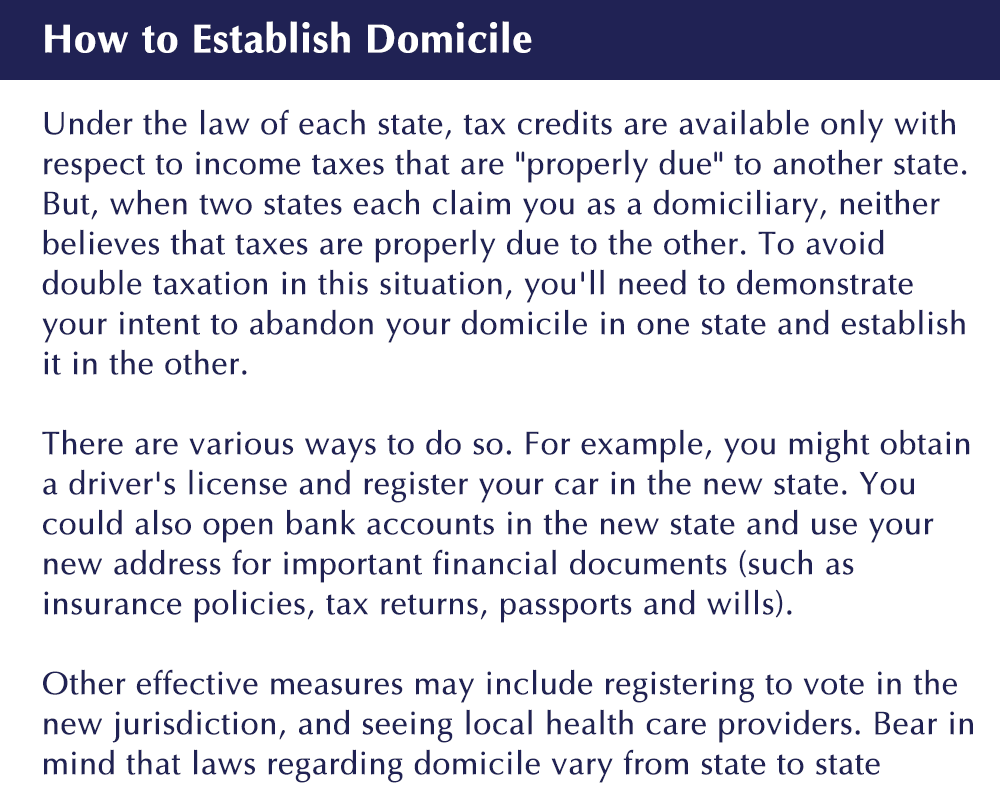Contrary to popular belief, there’s nothing in the U.S. Constitution or federal law that prohibits multiple states from collecting tax on the same income. Although many states provide tax credits to prevent double taxation, those credits are sometimes unavailable. If you maintain residences in more than one state, here are some points to keep in mind.
Domicile vs. Residence
Generally, if you’re “domiciled” in a state, you’re subject to that state’s income tax on your worldwide income. Your domicile isn’t necessarily where you spend most of your time. Rather, it’s the location of your “true, fixed, permanent home” or the place “to which you intend to return whenever absent.” Your domicile doesn’t change — even if you spend little or no time there — until you establish domicile elsewhere.
Residence, on the other hand, is based on the amount of time you spend in a state. You’re a resident if you have a “permanent place of abode” in a state and spend a minimum amount of time there — for example, at least 183 days per year. Many states impose their income taxes on residents’ worldwide income even if they’re domiciled in another state.
Potential Solution
Suppose you live in State A and work in State B. Given the length of your commute, you keep an apartment in State B near your office. You return to your home in State A only on weekends.
State A taxes you as a domiciliary, while State B taxes you as a resident. Neither state offers a credit for taxes paid to another state, so your income is taxed twice.
One possible solution to such double taxation is to avoid maintaining a permanent place of abode in State B. However, State B may still have the power to tax your income from the job in State B because it’s derived from a source within the state. Yet State B wouldn’t be able to tax your income from other sources, such as investments you made in State A.
Minimize Unnecessary Taxes
This example illustrates just one way double taxation can arise when you divide your time between two or more states. We have multistate tax experts that can research applicable state law and identify ways to minimize exposure to unnecessary taxes. Fill out the form following “How to Establish Domicile” and we’ll contact you.

Contact Us
© 2024 CPA Site Solutions.
Disclaimer of Liability
Our firm provides the information in this article for general guidance only, and does not constitute the provision of legal advice, tax advice, accounting services, investment advice or professional consulting of any kind. The information provided herein should not be used as a substitute for consultation with professional tax, accounting, legal or other competent advisors. Before making any decision or taking any action, you should consult a professional advisor who has been provided with all pertinent facts relevant to your particular situation. Tax articles in this blog are not intended to be used, and cannot be used by any taxpayer, for the purpose of avoiding accuracy-related penalties that may be imposed on the taxpayer. The information is provided “as is,” with no assurance or guarantee of completeness, accuracy or timeliness of the information, and without warranty of any kind, express or implied, including but not limited to warranties of performance, merchantability and fitness for a particular purpose.
Blog
Nonprofit Insights
